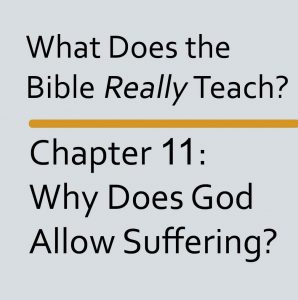Chapter 11 of “Bible Teach” has the weighty title, “Why Does God Allow Suffering?”
Paragraph 2 (p. 106) sets out the chapter’s primary topic in question form by asking, “Why does God allow suffering? If Jehovah God is all-powerful, loving, wise, and just, why is the world so full of hatred and injustice?”
The rest of the chapter is devoted to giving the Watchtower’s answer to those questions—that God is trying to prove to all intelligent creatures that his ways are better than Satan’s.
The Bible doesn’t give that answer, and so we need to need to call it into question.
Paragraph 3 (p. 107) states, “…the prophet Habakkuk asked Jehovah: ‘Why do you make me witness wrongdoing? And why do you tolerate oppression? Why are destruction and violence before me? And why do quarreling and conflict abound?’”
Paragraph 4 (p. 107) says that “God… helped him to get a clearer understanding of matters and to gain greater faith.”
What the Watchtower doesn’t tell you is that God never gave Habakkuk a direct answer to his questions! Specifically, he didn’t give him the answers the Watchtower puts forth in this chapter.
Instead, God told Habakkuk that justice would come in due time and that it was Habakkuk’s role to trust him. Habakkuk 2:4 gives the latter point succinctly, stating, “the righteous shall live by his faith.” (ESV).
The Watchtower answer—the sovereignty challenge by Satan
First, the Watchtower tries to drive a wedge between you and other religions. Paragraphs 5-6 (pp. 107-108) state: “People of various religions have gone to their religious leaders and teachers to ask why there is so much suffering. Often, the response is that suffering is God’s will and that he long ago determined everything that would ever happen, including tragic events…. They do not know a simple but important truth that the Bible teaches. You learned that truth in Chapter 3 of this book. The real ruler of this world is Satan the Devil.”
I recommend that you challenge the Watchtower’s simplistic answer by asking the Witnesses to explain John and Peter’s prayer in Acts 4:27-28: “For truly both Herod and Pontius Pilate with men of the nations and with peoples of Israel were gathered together in this city against your holy servant Jesus, whom you anointed, to do what your hand and counsel had determined beforehand to occur.”
Ask, “According to that passage, was the arrest, trial, and execution of Jesus solely instigated by Satan, Herod, Pilate, and the scribes and Pharisees? What role did Jehovah have in ordaining his suffering?”
Paragraphs 10-11 (p. 109-110) summarize the Watchtower’s sovereignty challenge explanation for suffering:
When Satan led Adam and Eve into disobeying Jehovah, an important question was raised. Satan did not call into question Jehovah’s power. Even Satan knows that there is no limit to Jehovah’s power. Rather, Satan questioned Jehovah’s right to rule. By calling God a liar who withholds good from his subjects, Satan charged that Jehovah is a bad ruler… [He] implied that mankind would be better off without God’s rulership. This was an attack on Jehovah’s sovereignty, his right to rule.
Adam and Eve rebelled against Jehovah. In effect, they said: “We do not need Jehovah as our Ruler. We can decide for ourselves what is right and what is wrong.” How could Jehovah settle that issue? How could he teach all intelligent creatures that the rebels were wrong and that his way truly is best?
Ask the Witnesses, “Do I understand correctly that the Watchtower doctrine is that Jehovah has allowed all the suffering in the world for the purpose of teaching all intelligent creatures that the rebels are wrong and that his way is best?”
Ask them to show you where the Bible itself gives that explanation.
It doesn’t.
Next week, we’ll look at a strange analogy the Watchtower has created in order to explain its position.


Leave a Reply
Be the First to Comment!